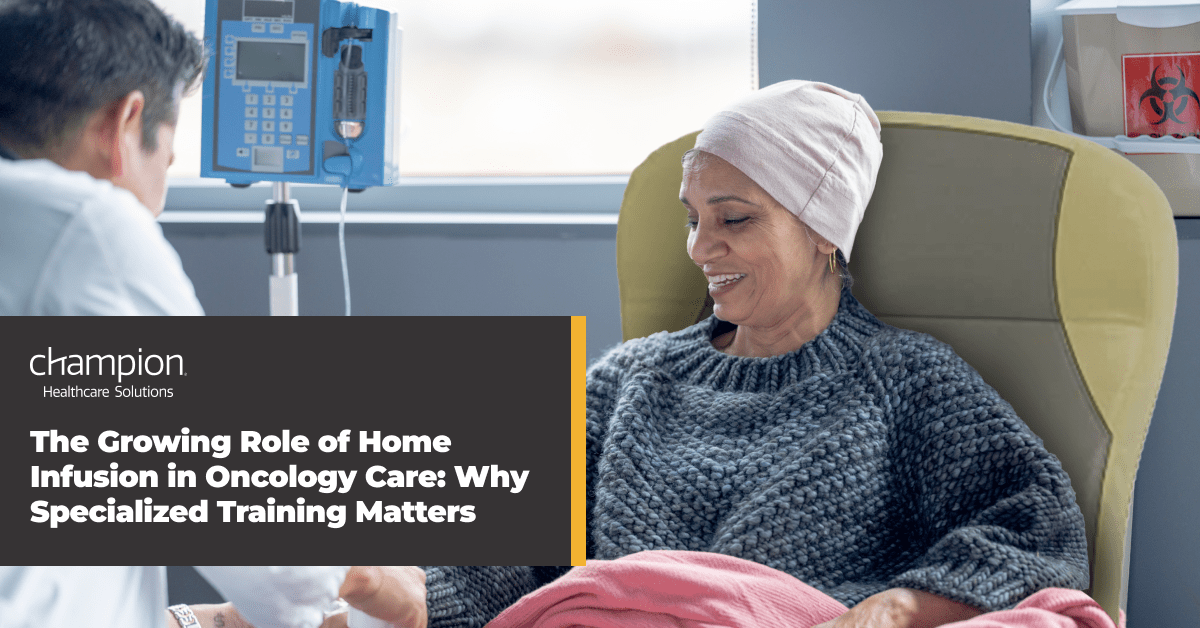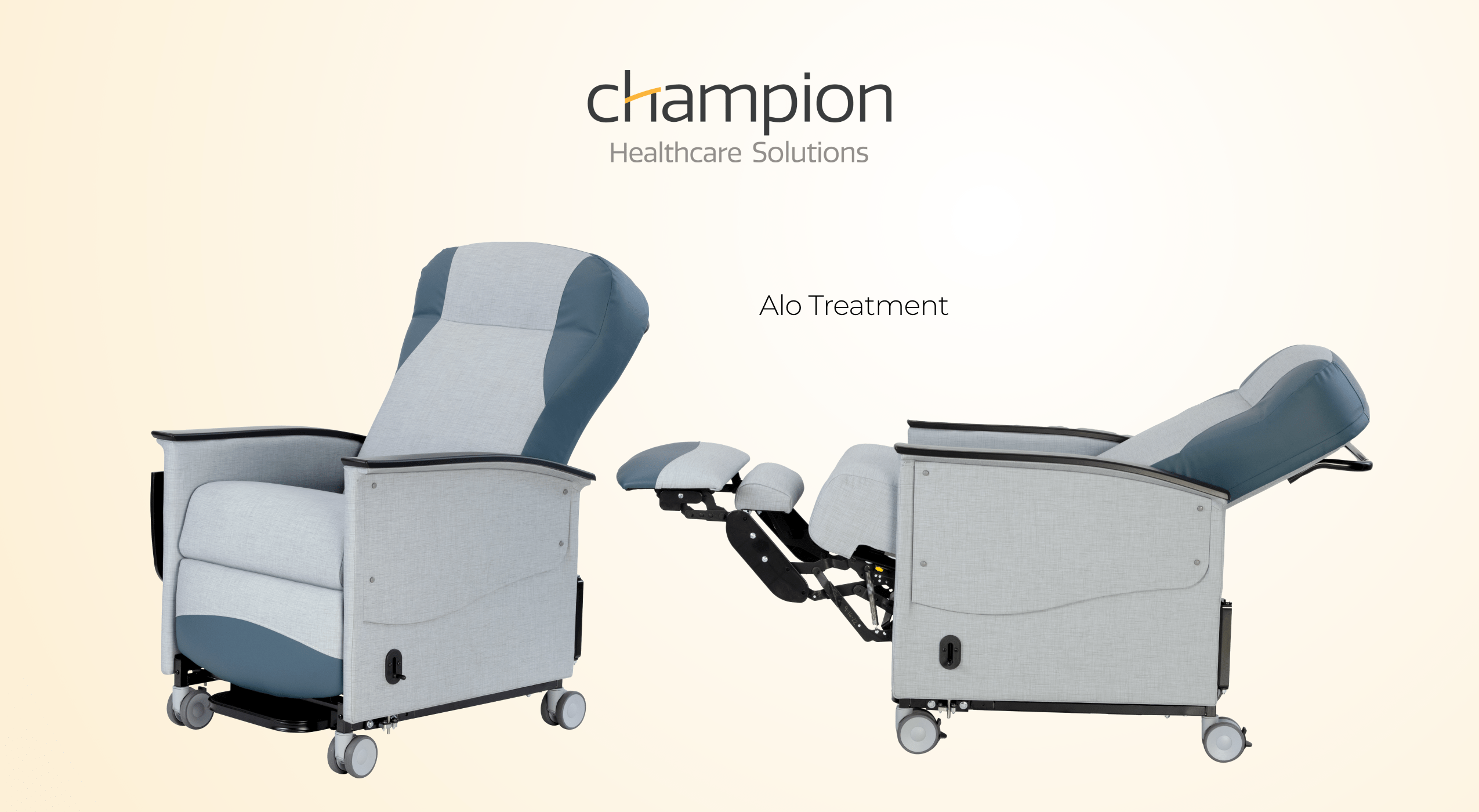
For years, oncology treatment has centered around hospitals, infusion centers, and outpatient clinics. However, today, the healthcare landscape is undergoing a shift. Advances in infusion technology, shifting patient expectations, and lessons learned from the COVID-19 pandemic have driven a steady increase in home infusion therapy for cancer care.
The benefits are clear: reduced hospital visits, improved patient comfort, and often lower overall costs. Yet, with this shift comes a critical need for specialized training for the clinicians who administer these treatments. Without it, the promise of safe, effective, and patient-centered home oncology care cannot be fully realized.
What Is Home Infusion Therapy in Oncology?
Home infusion therapy refers to the administration of intravenous (IV) medications—such as chemotherapy, immunotherapy, or supportive treatments like antiemetics—outside of a traditional healthcare setting, typically in a patient’s home.
While home infusion is well-established for conditions such as infections or chronic illnesses requiring IV antibiotics, its adoption in oncology has been more gradual. That’s because oncology infusions present unique challenges: complex drug regimens, narrow safety margins, and heightened monitoring requirements.
Still, healthcare systems worldwide are embracing it as part of value-based care models. A recent study published in the Cochrane Database of Systematic Reviews found that home-based cancer therapy not only improved patient satisfaction but also helped reduce healthcare resource utilization.
Sign up to get the latest industry news and offers right in your inbox
Why Home Infusion for Cancer Patients Is Growing
Several factors are fueling the increased demand for oncology home infusion:
- Patient Preference and Comfort: Cancer patients often face long, repeated visits to infusion centers. Home therapy reduces travel, exposure risk, and disruption to daily life.
- Pandemic Acceleration: COVID-19 highlighted the risks of bringing immunocompromised patients into crowded facilities. Home infusion emerged as a safer alternative.
- Healthcare Cost Savings: Shifting infusions from hospitals to homes lowers facility fees and can reduce payer expenditures.
- Advances in Technology: Portable infusion pumps, remote monitoring tools, and secure telehealth platforms enable safe at-home administration.
This movement reflects a broader trend toward decentralizing care and making treatment more accessible, convenient, and patient-focused.
The Risks of Expanding Home Infusion Without Training
Despite the benefits, home infusion for oncology care is not without risk. Unlike antibiotics or hydration therapy, cancer drugs are highly cytotoxic and require precise dosing and monitoring. Mistakes can have serious consequences.
Clinicians entering the home environment must navigate unique challenges:
- Drug Handling and Safety: Chemotherapy drugs can be hazardous if
improperly stored, prepared, or disposed of. - Patient Monitoring: Unlike in a clinic, there isn’t immediate access to a full medical team or crash cart. Clinicians must recognize and respond to adverse reactions on the spot.
- Environmental Variables: Rather than a sterile infusion suite, patient homes vary significantly in terms of cleanliness, space, and accessibility.
- Emotional Burden: Home infusion often brings clinicians into intimate patient and family settings, requiring sensitivity and emotional intelligence alongside clinical expertise.
This is why specialized training is not just beneficial—it is essential.

What Specialized Training for Oncology Home Infusion Should Include
For infusion nurses, pharmacists, and clinicians, training must extend well beyond standard IV administration. To support safe and effective cancer treatment at home, oncology home infusion training programs should cover:
- Oncology Drug Competency
- Safe preparation, transport, and handling of chemotherapy and immunotherapy drugs
- Recognition and management of extravasation, hypersensitivity, and infusion reactions
- Infection Control in Nonclinical Settings
- Best practices for maintaining aseptic technique in varied home environments
- Patient and caregiver education on hygiene, line care, and early signs of infection
- Emergency Preparedness
- Rapid response protocols for infusion-related adverse events
- Training in the use of portable emergency equipment and communication tools
- Patient and Caregiver Education
- Teaching patients and families how to manage side effects, troubleshoot pumps, and recognize warning signs
- Clear communication strategies to reduce anxiety and build trust
- Emotional and Cultural Sensitivity
- Respecting the personal nature of the home environment
- Providing compassionate support during vulnerable moments in the cancer journey
When combined, these competencies help ensure home infusion services meet the highest standards of safety, effectiveness, and patient experience.

The Impact of Home Infusion on Oncology Clinics
For oncology and infusion clinics, the rise of home infusion presents both opportunities and responsibilities.
- Opportunities: Expanding into home infusion services can increase patient reach, strengthen loyalty, and position clinics as leaders in patient-centered care.
- Responsibilities: Clinics must invest in training, protocols, and equipment that ensure the safety of both patients and clinicians outside of controlled environments.
Clinics must also rethink staffing models. Many infusion nurses already face high levels of burnout and workload pressure. Adding home visits without proper support could worsen these challenges. Clinics that succeed in home infusion will be those that pair specialized training with ergonomic, reliable equipment that eases the physical and emotional burden on caregivers.
Equipment That Supports Safe Home Infusion
Specialized clinician training is only half of the equation. The equipment clinicians use in home settings also plays a vital role in ensuring safety and comfort.
Infusion recliners, for instance, are often overlooked in conversations about home-based oncology care. Yet, the right chair can improve both patient and caregiver experience by:
- Supporting proper positioning for IV access
- Providing ergonomic features that minimize strain during patient transfers
- Offering comfort features that reduce stress during long infusion sessions
As more oncology care shifts to patients’ homes, clinicians need reliable, easy-to-clean seating solutions designed for demanding treatment environments.
How Champion Healthcare Solutions Supports Oncology Infusion
At Champion Healthcare Solutions, we understand the unique needs of both patients and caregivers in oncology infusion. Our Alō Treatment Chair is engineered to deliver comfort, safety, and efficiency in both clinic and home settings.
- For Patients: Ergonomic support, smooth positioning, and enhanced comfort during lengthy treatments.
- For Clinicians: Easy-to-maneuver design, accessible controls, and caregiver-friendly features that reduce strain and improve safety.
- For Clinics: Durable construction, infection-control materials, and customizable design options that align with your care setting.
Whether in a busy infusion center or a patient’s living room, the Alō Treatment Chair supports the highest standards of oncology care delivery.

Build the Right Solution for Your Patients and Clinicians
As the role of home infusion in oncology care continues to expand, investing in clinician training and high-quality equipment is critical. Together, they form the foundation of safe, effective, and patient-centered treatment.
Champion Healthcare Solutions is here to help you prepare for the future of infusion.
Find the right medical recliner with our virtual configurator, then connect with a Champion team member to ensure the perfect fit.
